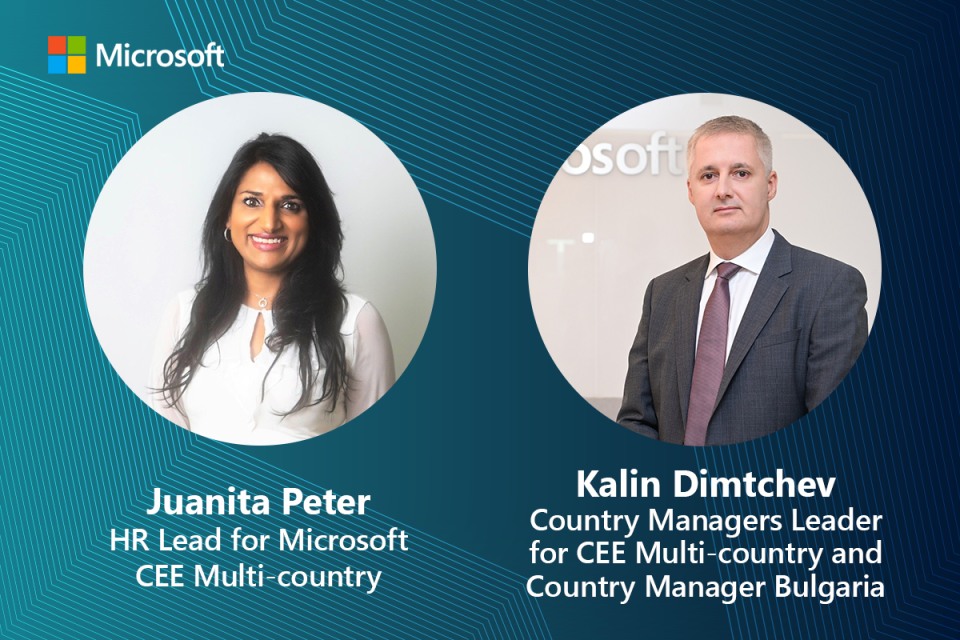For many people the process of job interview is a stressful experience, especially, if it concerns a very much desired company. Everyone goes through this process – from intern to a top manager. The secret ingredient for a successful job interview is to be prepared. Learn how Microsoft is selecting talents with the right skills and what mindset the company is looking for from insights given by Juanita Peter and Kalin Dimtchev.
Juanita Peter is HR Lead for Microsoft, CEE Multi-country focused on coaching, organizational and leadership development, succession planning, leading diversity & inclusion, culture & transformation programs. Broad range of experience spanning across cultures and geographies having lived and worked in 3 continents and performed HRM and Business Manager roles in Middle East & Africa, Asia Pacific, Ireland and now Central Eastern Europe. Kalin Dimtchev, Country Managers Leader for CEE Multi-country and Country Manager Bulgaria in Microsoft, business leader working in multinational corporate environment for more than 13 years. Believes real impact is based on culture, trust, and sense of urgency to implement big ideas. Currently, Kalin leads the Bulgarian market for Microsoft and oversees the Country Managers work for a region of 25 countries.
Are there any awkward and mandatory questions during an interview and how long does it take to express an interest in the candidate?
Kalin: When interviewing for a role in Microsoft, be prepared to demonstrate how you meet the qualifications of the job by sharing specific examples from your past or ideas about how you would accomplish a specific task. We also want to see not only what you know, but also how you think. Be prepared to share your thought process and explain the rationale behind your decisions.
What is the most valuable advice you would give to a person going for an interview? Do you think it is possible to send advice online to the candidates in advance about the most important topics and then, during the interview itself, you can see how he/she has really prepared?
Juanita: Many of our successful candidates demonstrate a level of understanding of our business and explore how the role they have applied for contributes to Microsoft’s mission. They come prepared with questions about the role, the company, and our culture. Thoughtful questions show their level of understanding, their interest, and passion. We are also very interested in how candidates come up with solutions, and whether they can clearly explain their thinking process – they should be prepared to share examples of past experiences.
How important is the first impression when you see a candidate, even before you start asking questions? What kind of candidates do you prefer: more aggressive or more relaxed in approach? How do you take into account the factor of momentary mood, both yours and the candidate’s, and how is this reflected in the process of conducting an interview and the conclusions from it?
Kalin: We value authenticity and unique perspectives. We invite you to come as you are. So, you don’t need to dress up to impress us. This will help us understand how your personality and experience fit our requirements for the role and also your ability to adopt our corporate aspire-to culture focused on integrity, collaboration, and ability to be resourceful. Microsoft aspires to have a work environment free from discrimination, the one where people are treated with dignity and respect.
Which has prevailed so far in your experience when choosing a candidate – the remuneration or the desire to develop in the company? Would you hire a candidate if he/she doesn’t meet many of your criteria, but you see serious potential to catch up and develop what’s missing?
Kalin: We believe that everyone can grow and develop; that potential is nurtured, not predetermined; and that anyone can shift their mindset. During the interview process we seek out candidates that demonstrate a growth mindset, always learning and showing curiosity, willing to lean into uncertainty, taking risks, and who move quickly when they make mistakes, recognizing that failure happens along the way to mastery.
What does the ideal job candidate look like in your opinion and based on your understanding? What are the three most valuable qualities that would impress you? What corporate values do you teach your employees?
Juanita: Selecting talent with the right skills and mindset helps us to positively impact our business today while helping us toward our mission to empower every person on the planet. At Microsoft, we do not just value differences or different perspectives from our candidates. We seek them out and invite them in so we can tap into the collective power of everyone in the company. Our hiring managers play a key role in modelling Microsoft’s aspire-to culture of inclusion in every step of the hiring process. Assessing the minimum role requirements as well as a candidate’s ability to learn additional preferred skills enables us to hire for today and for the future, as the industry adapts.

What are your impressions of the internship programs in your company? Do you manage to find enough talents to take their first career steps with you? What do you think about the new wave of young people coming out of universities?
Juanita: The Microsoft Internship Programs is a wonderful opportunity for interns to join our Commercial, Engineering or Operations team, where they develop their talents while working on real life projects. The training program is focused on 70% learning on the job, 20% learning from managers, peers, and mentors, and 10% learning through structured courses and role-specific training. As well as hands-on training, interns are also an integral part of community events and everything else that comes with working at Microsoft. We hire interns who seek to inspire others with the power and potential of technology to improve lives and businesses.
Tell us in a few words the most important highlights of your career start. If you could go back in time, would you change anything? What is the most important moment that has defined your career?
Juanita: My HR career started in South Africa where I worked with HR Leaders on standards framework for Performance Management and tailored retention strategies. I joined Microsoft South Africa in 2008 where I was driving programs at scale for the Middle East & Africa region, demonstrating my passion for leadership development and diversity & inclusion. One of the projects I am proud of is developing the very first women’s leadership academy at Microsoft South Africa with a focus on building leadership capabilities and advancing career experiences for women in mid-management roles. These are the moments that defined my career, and I would not change anything. Also, the open conversations with my managers and mentors about my goals and ambitions helped me to create learning and growth experiences for myself to achieve my goals and career aspirations.
Kalin: My career started from a small Entrepreneurial business in e-commerce and continued in large regional and multinational companies in the finance and IT sectors. My opinion is that every step of the career, in whichever industry, regardless of the company size and my role in it, is a learning adventure that I embrace and build my professional experience on. Looking back at this point of time, I would not change anything about the decisions I took. I would only follow a simple principle, that a company with clear mission and strong values, like Microsoft, is a great place for overall growth and development in the long term of the career journey.
Have your criteria for evaluating the performance of current and future employees changed in the context of Covid? What policies do you have for team bonding and a positive working atmosphere?
Juanita: About 9 years ago we shifted from a process that rewarded individual effort and results to a mechanism that incentivizes collaboration & business impact. We define impact in 3 areas – individual accomplishments, building on work of others, and contributing to success of others. This has helped to reinforce the supportive culture that enables us to collaborate and innovate. This is an interesting model for other organizations to consider, as the pandemic has probably helped many organizations re-define their assumptions of productivity. We also introduced a set of leadership principles and expectations for our managers, training them to have a “model, coach, care” approach, encouraging them to bring out the best in their people.
Which work model does your company prefer – work at the office, from home or depending on the job requirements?
Kalin: We prefer a hybrid working model that provides flexibility to support individual work styles, balance business needs and ensure we live our culture. There’s no one-size-fits-all solution given our variety of roles, work requirements, and business needs. We offer many flexible work options and have encouraged employees to work with their managers. For most roles, we view working from home part of the time (less than 50%) as standard. For more details: Embracing a flexible workplace
Do you expect the standard workplace to look different in 2-3 years?
Kalin: Yes, the experience of the past two years has left a lasting imprint on the way people want to work. The latest Microsoft research showed that employees are asking for flexibility – hybrid work, the possibility to work from office or from somewhere else. Leaders will need to adapt the way their teams work and to establish and nurture a new digital corporate culture to fulfill needs of employees. A collaborative digital culture can help in bridging geographic distance, improving efficiency and driving innovation. All this is possible to achieve with the proper digital tools. For example, Microsoft developed the first employee experience platform built for the digital era – Microsoft Viva. It brings together communication, communities, knowledge, learning, goals, and insights right in the flow of Teams to address key challenges of hybrid work. Unilever, for example, adopted Microsoft Viva to provide individuals and managers with data-driven, privacy-protected visibility into how work patterns affect employee wellbeing and productivity. Over the past year, these insights have helped the company improve the employee experience and promote greater work-life balance amongst their global employee base.
Source: The thought process in the chapter predetermines the direction of our decisions | Business dir.bg





